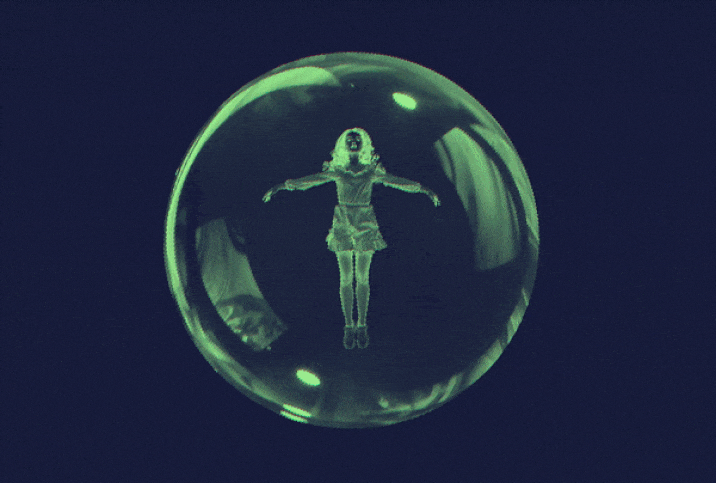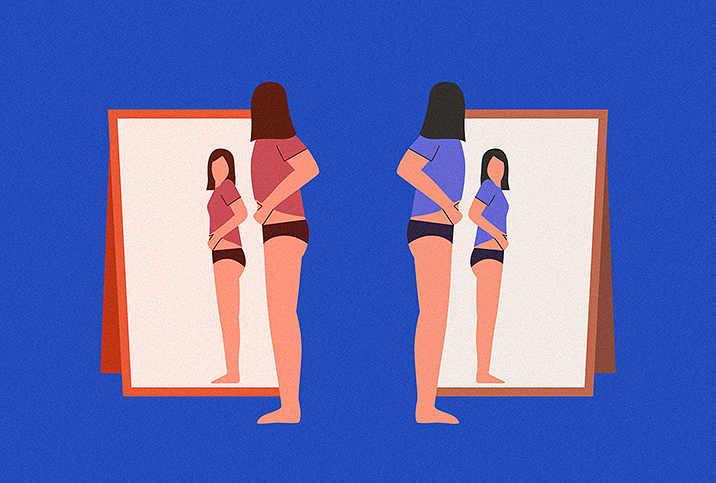What Twice-Exceptionality (Really) Means for Mental Health

When I was growing up, my family told me stories about a state psychiatric hospital in western Pennsylvania. Two of my ancestors—a great-grandfather and a great-uncle—lived at the hospital on and off for years while undergoing treatment.
Both men passed away before I met them. Their lives ended prematurely—one by suicide and the other for mysterious reasons nobody ever pinpointed. These stories, my first introduction to mental health, were mysterious and frightening.
According to my dad, doctors diagnosed my great-grandfather with schizophrenia. His worst moment was when he accused his wife of trying to poison him with unsweetened baker's cocoa. That was "back then," my dad disclaimed. Doctors said everybody had schizophrenia, he argued, and my great-grandpa's diagnosis might have been different today.
Sifting through old stories is like an excavation. I encounter remnants of information, clues leading to temporary conclusions, but I never achieve clarity. As a descendant of people who were institutionalized, I've carried worry from a young age that something may be wrong with me, too.
Fortunately, I've been lucky. In first grade, my teacher observed my neuroatypicality and identified me as gifted rather than disordered, granting me special freedom to leave the classroom twice a week and participate in a different kind of learning. "Gifted class" involved glitter, feathers and papier-mâché. We wrote scripts, sewed costumes and engineered structures with popsicle sticks and clay.
I was exceptional, according to Pennsylvania state guidelines for special education. The Pennsylvania state guidelines for gifted students classified us as "children with exceptionalities." Under the Public School Code of 1949, students are exceptional when they have cognitive, intellectual and developmental differences, and therefore need specialized instruction.
But what happens when there's more going on below the surface?
Twice-exceptionality and managing multiple diagnoses
A child is considered "twice-exceptional" when they have another neuroatypicality in addition to their giftedness. Traditionally, this refers to a learning disorder, such as dyslexia and dysgraphia, but you can often find discussions about giftedness and attention deficit hyperactivity disorder (ADHD)—an executive functioning disorder—or giftedness and autism spectrum disorder—a developmental disorder—or even giftedness and emotional disorders, such as obsessive-compulsive disorder (OCD), anxiety and depression.
I'd argue most people—gifted or not—with mental illness or atypicalities understand twice-exceptionality. Mental health comorbidity—the presence of simultaneous conditions—is common. Bridge symptoms shared by two different psychological disorders can eventually overlap and activate new patterning, such as depression blurring into worry and leading to anxiety. In the same vein, undiagnosed learning differences can lead to feelings of low self-worth, and therefore set the stage for anxiety and depression throughout childhood and into adulthood.
For me, it's certainly hard to tell where my giftedness starts and my ADHD, anxiety and depression begin. Each of these "exceptionalities" shares symptoms like rapid thoughts and speech patterns, impulsive behavior, extreme emotional swings and existential despair (you know, for a fun layer of icing on the cake).
Existential despair isn't exactly a medical symptom, but it's an experience I'm quite familiar with. When I was evaluated for ADHD at age 30, the psychologist suggested I may also have bipolar type II, characterized by depression and less intense periods of elevated moods, called hypomania.
When I experience despair or even intense anxiety, I often feel compelled to take on the world and move through the discomfort by finding solutions. I clean. I rearrange furniture. I cut my hair. I replace my entire wardrobe. This quality of reinvention is often praised, and it certainly aids in my creative writing—but it's also considered a little too much in certain environments.
Yet, the suggestion of bipolar came as a surprise. Sure, the symptoms may look similar, but I'd never paused to consider whether they were severe enough to warrant walking down the path of clinical treatment.
As I left the psychologist's office, I felt grateful for the teacher who read me as gifted and not disordered. Growing up with a healthy foundation of support from my educators makes me now feel empowered as an adult to choose how I manage my diagnoses and symptoms, or whether I even identify with them at all.
But would I have been so lucky back when my ancestors might have been misdiagnosed and sentenced to live their lives in a hospital? And more importantly, how many of us get lucky today, in a culture where the jury's still out on how equitable IQ testing in children is or what IQ is even measuring?
Coming to terms with neuroatypicality
You could say IQ testing saved me from potential institutionalization, but if that sounds too dramatic, let's go with a generalized conclusion: Support systems, combined with the right opportunities, help people flourish. My teacher saw a difference in how I talked, worked, socialized and thought, but she looked for positive outlets to let me be me.
According to London-based cognitive hypnotherapist Kirsty Macdonald, this may have been the exact right approach.
"It's very often that searching for a label is like sleight-of-hand magic. You're looking over here when something else is going on over there," Macdonald said.
Moreover, each of us presents our symptoms differently, whether we're dealing with anxiety, depression, bipolar or schizophrenia. We may be better served by neutral observation of our patterns rather than looking for the right title to give our disorder, Macdonald said.
"The minute we hold something on an identity level, it's far more difficult to shift," she explained.
While labels and diagnoses can bring clarity and scientific research, we risk becoming too tethered to a diagnosis and overlook aspects of our personalities we are proud of and that contribute positively to the world.
Getting the help you need
Of course, in the U.S., diagnosis often plays a pivotal role in getting someone the help they need, said New York–based counselor Kaylee Dueber, LMHC.
"Insurance typically will only reimburse you if you have a diagnosis," Dueber said.
Keeping this larger perspective is important as you begin to work with any mental health symptom or neuroatypicality. We are working within an established medical system, and seeking treatment involves filling out intake forms that attempt to categorize or classify your symptoms.
"Oftentimes, it will just be an initial diagnosis and I'll say, 'This is what we're gathering, but let's keep exploring to see if this actually fits the mold,'" Dueber said. "I don't think people always want a diagnosis off the top. Some people are not ready to be associated with a category of patterns that might have a stigma, whereas for some it can be incredibly liberating."
Whether you work with a coach, a therapist, or a counselor/psychiatrist who prescribes medication, being equipped with self-knowledge can be a powerful ally. Understand your symptoms are patterns you can work with as you choose. Initial diagnoses are often very broad and may be titled "unspecified." Over time, the diagnosis can become more specific and fitting to what your symptoms are.
Dueber outlines the following areas where symptoms or patterns may show up. Prior to and during your mental health treatment, journal about how these experiences shift throughout the day:
- Cognition: Thought patterns, self-talk, beliefs
- Behavior: Actions, tendencies, habits
- Emotion: Feelings, mood, quality
- Energetics: Body-based, physical sensations
Remember, fluctuations are, to a certain extent, quite normal. Notice what variations are normal for you, and commit to your well-being by seeking help if any experiences become too intense to navigate without support.


















